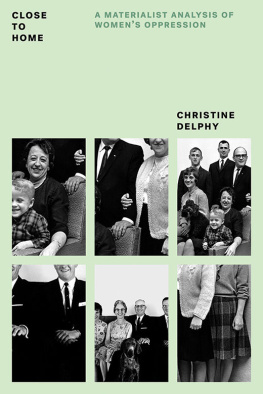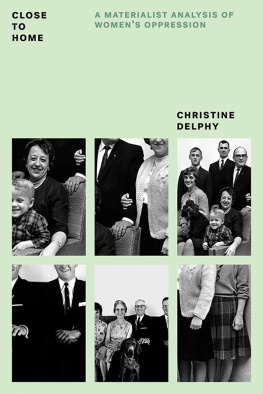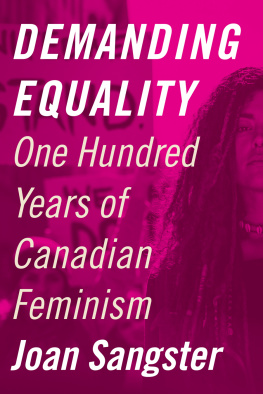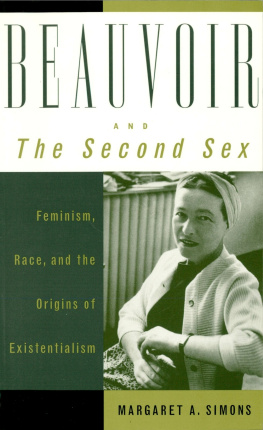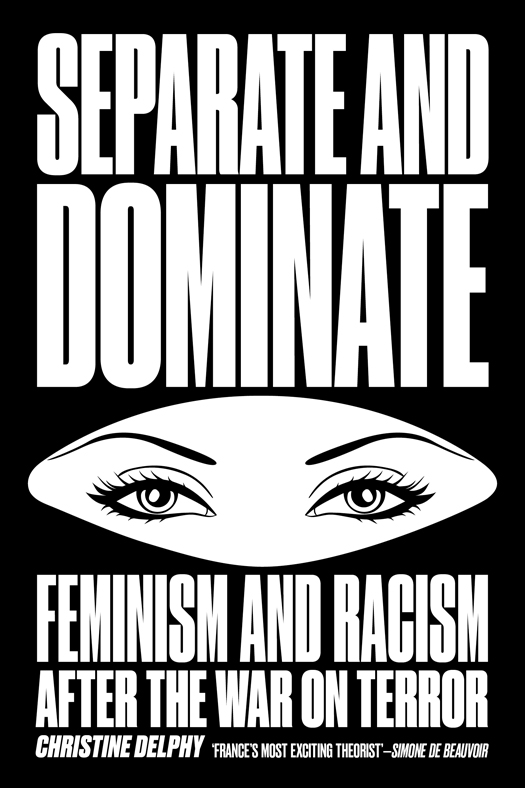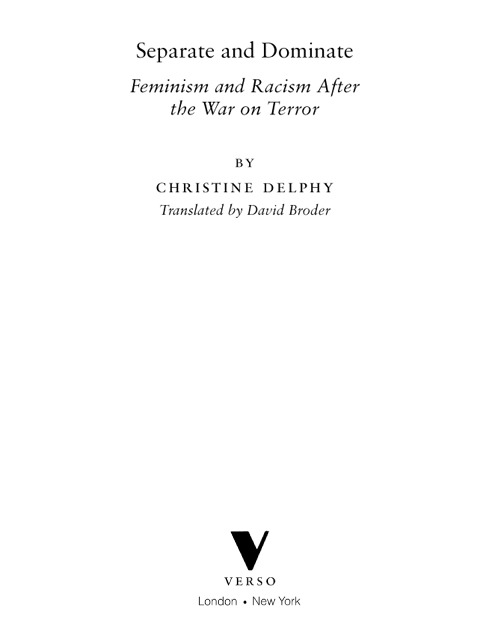CHRISTINE DELPHY is a French writer, sociologist and theorist. She co-founded, with Simone de Beauvoir, Nouvelles questions fministes, and is the author of Close to Home: A Materialist Analysis of Womens Oppression.
This English-language edition published by Verso 2015
Translation David Broder 2015
First published as Classer, dominer: Qui sont les autres?
La Fabrique 2008
was a contribution to the Actuel Marx conference, September 2004.
Author and publisher would like to acknowledge the publication of earlier versions of the following: , Nouvelles Questions fministes, 25 January 2006.
All rights reserved
The moral rights of the authors have been asserted
Verso
UK: 6 Meard Street, London W1F 0EG
US: 20 Jay Street, Suite 1010, Brooklyn, NY11201
www.versobooks.com
Verso is the imprint of New Left Books
ISBN-13: 978-1-78168-880-9 (PB)
ISBN-13: 978-1-78168-879-3 (HB)
eISBN-13: 978-1-78168-881-6 (US)
eISBN-13: 978-1-78168-882-3 (UK)
British Library Cataloguing in Publication Data
A catalogue record for this book is available from the British Library
Library of Congress Cataloging-in-Publication Data
A catalog record for this book is available from the Library of Congress
v3.1
Contents
Introduction to the English-Language Edition
This book deals with the oppression of all people we commonly call Others. These include women, queer people, Guantnamo inmates, civilians bombed in Afghanistan by the forces of civilization, and Arab women excluded from school by the same forces in France. Despite the varied ways these groups experience oppression, their oppression also appears to share certain traits in common, if examined through the theoretical lens of the Other. Societies deploy certain mechanisms in order to fabricate Others, and I argue that the discourse on the Other is above all a justification of the non-discursive fact that Others live under the thumb of the Ones. Nobody talks about the Ones even though it is self-evident or should be that the One and the Other go together like a horse and carriage.
Every country, every society has its own Others, and the ones I discuss here are for the most part French. But only for the most part. All Western societies share Others in common: women, queer people, vulnerable foreign civilians. Even the Guantnamo inmates are our common responsibility as a consequence of the Allied in War on Terror.
Different societies use different mechanisms to frame some as Ones and some as Others. The mechanisms are material: they are about denying them equality and treating them as not quite up to the mark, abnormal, or downright sub-human. Instilling in them these beliefs about themselves, depriving them of self-confidence, of a sense of their worth, of dignity, of the conviction that such a thing as justice exists. Making
I began writing these chapters in 1996. Are the situations I describe outdated? I wish they were, but they are not. The established Ones remain resilient. The political scene is solidly occupied by White men who give no sign of wanting to give up their positions. In France, conservative parties are ready to forego huge state subsidies in order not to have to present a number of women candidates on their party lists equal to the number of men there. And what is true of the rather rich middle-aged conservative men is also true of the young, poor, leftist men, who are not ready to let women talk at meetings, to let them get a word in about what the society of the future should look like.
In France, for the last forty years, there has been talk of fighting racial discrimination, but no measures whatsoever have been taken to that end.
At the same time as Europe was urging all its members to fight discrimination, there emerged a notion that Islam was the problem. And the Ones, including members of the ultra-left, agreed. Islam had not been a problem so far. But some teenage girls started going to high school wearing headscarves. And, gradually, between 1989 and 2003, this was constructed by anti-Arab lobbies as an act contrary to the French version of political Gradually, the children and grandchildren of immigrants from North Africa, a territory recently vacated by the French, who had conquered and occupied it for one hundred and thirty years, children and grandchildren born in France and French, started to be called second- (or third-)generation immigrants. Not French. Immigrants. Gradually they were perceived as and called Muslims.
Political secularism was deemed to be under threat, endangered by this Other religion (which many descendants of immigrants do not practise). For forty years, hardly a week went by without one or other of Frances two main weeklies (LExpress and Le Point) showing a fully veiled woman on its front cover with a caption along the lines of Is Islam compatible with democracy? This attack on a culture for even to the non-practising, Islam was the religion of their family, was part of their roots led a part of the younger generation to embrace it anew, thus confirming the worst suspicions of the true French (the Whites).
After years of being both brainwashed and confirmed in their racism and their dominant status (the one thing that really matters), the Whites, who had never socialized with Arabs or with the black part of the population, who had relegated non-White communities to the outskirts of cities and towns, who kept for themselves the best housing, the best schools, the best jobs and in the last thirty years the few jobs had found a good reason to go on discriminating: these people are just not deserving of equal opportunities.
And so things have been going from bad to worse. These home-grown rationalizations of racism find significant support in the international arena. People of Arab descent identify how could they not? with Palestinians, and get angry about French support for brutal Israeli policies: the regular massacres of Gazan civilians, the annexation and colonization of Palestinian land, not to mention their constant harassment by Israeli settlers. This identification is deemed criminal by the Establishment.
To that one must add the fact that for the last twenty years, the Middle East has been the target of military attacks and invasions, which have left it in utter chaos. And for what? The reason for these Western wars in which France has participated, with the exception of the last war in Iraq is still waiting to be discovered by historians not yet born. Anti-Muslim, anti-Arab propaganda is not waning. On the contrary. In the fall of 2014 a book-length pamphlet prophesying the replacement of the French population by Muslims became an instant bestseller in France. The author, in an interview given to an Italian newspaper, said French Muslims ought to be deported (to where, he didnt say).
France was the only country in the world to prohibit marches denouncing the Bombing of Gaza in the summer of 2014. Can one be surprised that some third-generation immigrants in fact an amazingly small number of them incensed at the way they are treated by their own country (France) run amok?
With the recent assassination by Muslim youths of twelve people working for the satirical journal Charlie Hebdo which consistently derided and insulted Islam and four customers in a Jewish supermarket, things got far worse. There was a downward plunge, and the prime minister announced that France was now at war. He did not say with whom, but it was clear to everybody that the enemy was inside our walls.


